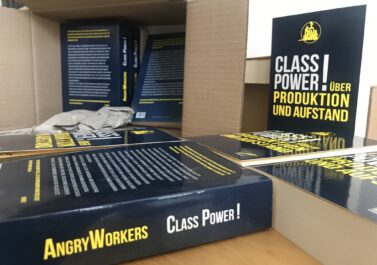A friend of ours wrote a contribution to the current debate within the IWW in the US:
One of us wrote down some thoughts:
I read your recent article on the IWW-caucus debates and want to share a few thoughts. We suggested discussing the article together with contributions from both WRUM and IUC at an informal smile meeting with, amongst others, comrades from IP (Workers’ Initiative, Poland) and El Salariado (Spain) in September – hopefully we can expand on the discussion after the meeting.
First of all, I share your criticism of IWW formalism based on my one year experience of being a member of the IWW in the UK. Too much time and effort is spent on keeping the structure going and re-shuffling it. Actual exchange of working class experiences is minimal, both because the exchange of, e.g. workplace reports or reports about local / town-wide proletarian experiences is not seen as a central function of a ‘national’ organisation and because there is an actual lack of experiences, too. I share all suggestions you make to foster the ‘real IWW’, meaning, the creation of open channels for strategic debate etc..
What I think is lacking in your criticism is the question why people maintain the importance of formalised structures, even though they suck up so much energy and can create pretty absurd relationships. You treat formalism a bit like a religious fetish: you mainly describe the absurdity of over-emphasising formal over practical relations, but you write less about why you think people do this. A formal structure with all the membership business, formalised functions etc. is probably more than just a ‘soul’ in a ‘soulless world’ that gives people a sense of belonging and cohesion by wearing IWW badges.
In the following I will play a bit of devil’s advocate for the IWW as a formal union structure. Behind this is our own grappling with the concept of a ‘class union’ (probably more a Spanish/Italian term). A union as a body of workers’ association that can operate within the legal limits of the labour law etc., that can call for official strikes etc. has to be a formal structure. That’s by default, the legal circumstances prescribe it and the potential mass base requires it. For us the question is if there is a role for such a union structure that can be used by workers as one (!) means of self-organised struggle. A ‘class union’ would be open to workers of different political persuasions and professions etc. to conduct their struggle on the official level, as self-organised and unified as possible – which wouldn’t mean that there aren’t any other levels of struggle. Different political tendencies and organisations can relate openly to the class union, offer debate, education, strategical suggestions. As I said, this is hypothetical and I am not sure whether it is possible to actually formalise the relation between a rank-and-file union and ‘political organisations’ in a fruitful manner.
So what kind of concerns might hide behind formalism?
1) Keeping the focus on ‘the work-place’ as an reaction to the middle-class character of the ‘milieu’
Some of the formalism (“let’s just be a rank-and-file union for everyone”) is an expression of wanting to stay focussed on the sphere of production or rather, and that’s the problematic bit, ‘the workplace’. It is a reaction to the fact that most activists come from student and middle-class backgrounds, for who it comes easier to get engaged in ‘political struggles’ than to get rooted in daily lives of workers. Perhaps I am wrong, but my criticism of formalism would start with seeing it as an unproductive and unclear effort to keep the organisational work focussed on ‘the real thing’. The problem is that this is not spelled out politically: how do we see the production process today? how does it or does it not relate to other spheres of working class lives? how is it stratified racially and gender wise? etc. Instead, and you describe this clearly, it gets ossified in the organisation itself and an IWW methodology which breaks up a dynamic and contradictory social process into (perhaps more manageable) individual economic units (memberships, branches etc.) that are gradually joined together.
Because you mainly focus on the ‘real’ and current aspects of struggle in order to criticise the emptiness of formalism I feel that you have to treat class struggle with a certain immediacy perspective: whatever happens is the focus. Here I think we have political differences – and to be fair, I deduct this not mainly from your article on the IWW, but from recent Unity and Struggle texts and focus. I hope you don’t take it the wrong way! This perspective that ‘class struggle is nowadays happening mainly in the sphere of social reproduction, because actual production has lost its significance for capitalism’ is propped up by historically and empirically questionable arguments made by groups like Endnotes etc. As we could see during most recent situations of ‘popular uprisings’, from Argentina to Egypt, the battle in the streets and for the squares can only produce a limited vision of social change. The ‘point of production’ remains the centre of workers’ self-emancipation and social transformation, not mainly because of some economic leverage or quantitative/empirical dimensions, but because of its social and material characteristics: people produce the material world and social relationships as capital, rather than just opposing or confronting it. The left has to engage in a deeper inquiry process about the modern production process and its social scope, rather than just keep on repeating empirically questionable opinions (‘all gonna be automated; everyone will be surplus; nothing’s happening’).
2) Formalism as a way to provide a necessary structure and resource for workers to use
I therefore understand the general urge to ‘get rooted’ and of consistent and continuous organising, the problem is that in the IWW this largely happens in an unsystematic and unstrategical manner:
a) either IWW members just ‘organise where they are’ – and ‘where they are’ is seen as a kind of natural state of being – which explains the large numbers of student-type of jobs in organic food-stores represented. That’s kind of fine, but I would expect more strategical focus of the largely politically motivated members;
b) the organising focus is chosen on the basis of what ‘benefits or suits the IWW’ as an organisation, e.g. because the mainstream unions are not present or the IWW would get good publicity. Large areas of working class lives and potential power in the big industries (transport, agro-industry, manufacturing, public services etc.) are ignored, because the IWW would lose the official competition with the mainstream unions. This is problematic, because the starting point is not the working class, but the organisation.
Again, politically conscious members should debate where the current potentials of generalisation of class struggle are, e.g. because of new structural power, such as in logistics, or because of the general working class atmosphere, such as at the conjunction of low wage and anti-racist / anti-deportation struggle.
To make my point clearer I use the example of the IP (Workers’ Initiative) in Poland. From what I know their actual formal structure is way lighter than the IWW, less meetings mainly focussed on running the organisation. They nevertheless function as an official union shell that workers can use. In the case of Amazon it was Amazon workers (many of them supervisors who had experiences of working at Amazon abroad, before they opened the warehouse in Poznan) who approached the IP, because they saw that here they could ‘run their own union’, rather than being patronised by main-stream unions like Solidarnosc. IP is now the main representing union at Amazon Poznan and has managed, amongst other things, to organise international meetings of Amazon workers. The same happened recently at VW, where over 500 workers left Solidarnosc and joined IP – something quite incredible, knowing how VW manages union representation in general. IP comrades facilitate the process of ‘running the union’, but as far as I am aware of, they keep their other activities, e.g. squatting and housing struggles, work in the anarchist federation and theoretical discussions formally outside of the union, though workers can get in touch with this political dimension informally and personally.
3) Formalism as practice to run a potential mass organisation
Playing devil’s advocate ain’t easy, but another possible underlying reason for a formalism which seems stifling and for-its-own-sake in an organisation of the size of the IWW is that it’s partly meant to be a structure for a potential mass organisation. This seems very hypothetical, but let’s take Si Cobas that you mention in your article as an example. You are right, Si Cobas didn’t grow gradually, but through a combination of factors: structural growth of the logistics sector, migrant work-force influenced by the Arabic Spring, old guard of experienced comrades from the vanguard of class struggle in the 1970s, a political and social ‘ecology’ of militants, squats and strategical thinking. They grew from a few hundred members to over 10,000 within a couple of years or so. They had no paid staff or elaborate committee structures. Collecting membership dues is pretty random. The lack of formal structures create problems when it comes to the question how the organisation is run and by whom. The organisation is dominated by ‘the most active’, to the extent that the political leadership of Si Cobas can threaten delegates elected by workers to be sacked if they don’t turn up on pickets etc.. No doubt it is a very dynamic organisation, but for workers who are not or cannot be on the forefront the whole time it might be less transparent how things are run. (Having said all this in defense of more formalised structures there are obviously numerous examples, also within IWW, where individuals can hide behind structures and manipulate them in their favour. Attempts by more Leninist-oriented factions in London IWW to steer the IWW into different waters were not met with an open political debate, but they were excluded on formal grounds of having tried to ‘build a separate union structure’)
—–
For us in AngryWorkers the IWW involvement is also an experiment about how largely migrant workers in the bigger workplaces in west London relate to more formalised union structures. For three years we try to get workers in warehouses involved through informal workplace groups and solidarity networks, with modest success. Where we work – workplaces with 1,000 plus workers – there is a mainstream union present, which means that formally the IWW will have little chance to act on the shop-floor. We try to act inside and outside the official unions in this case. We suggested to London IWW to start a three months organising trial at a dozen workplaces where no union is present – see invitation letter below. We are interested to see if the official union status of the IWW and the potential to, e.g. force management to act to an official wage dispute will make a difference. If workers react differently to more powerful looking union banners and decorum of officialdom. In addition to us offering workers to make use of the formal character of the IWW as a union vehicle, the organising drive will mainly be an effort to create a link between some of the London political scene and largely female, migrant workers in the outskirts, whose specific problems inside and outside of the workplace need to be addressed. We’ll keep you updated about this effort and how it goes.
To conclude:
As I said, I agree with the measures you propose to make the current debate within and around the IWW and their caucuses more productive. I would add the following:
* debate the IWW as a ‘class union’, meaning, the IWW does not have to be a political and cultural home for anarchism, but a well structured organisation that workers of different sectors can use as an official formal body and as a means to exchange experiences; a sharpening of focus would allow to strip down a lot of the formal work
* figure out how a wider political debate and political activities can be organised around the ‘class union’ in a fruitful way, instead of different political factions fighting over the IWW as a political organisation
* focus the political debate away from ‘what the IWW should look like’ towards ‘where are developments within the class, either because of material changes in production or because of class activity’ where the IWW can function as a bridge and tool of self-organisation
* encourage locals to re-root themselves and to discuss their problems and experiences doing this: pick an area of town for a solidarity network; pick three, four bigger workplaces as organic focus; try to create a dynamic between both solnet and workplaces through meetings and a local publication; see the local newspaper not in merely geographical terms (leaving the paper in local shops etc.), but related to specific workers problems and places, e.g. go to the same areas and workplaces regularly; create a blog to communicate your experiences to the rest of the milieu/organisation
I send this as a personal mail, but if you think it’s helpful I would post it on your blog and perhaps on libcom as a partial reply to Nate. Let me know what you think…
Warm wishes from Greenford, greetings to the others
IWW organising event:
https://en-gb.facebook.com/events/414487308945865/



